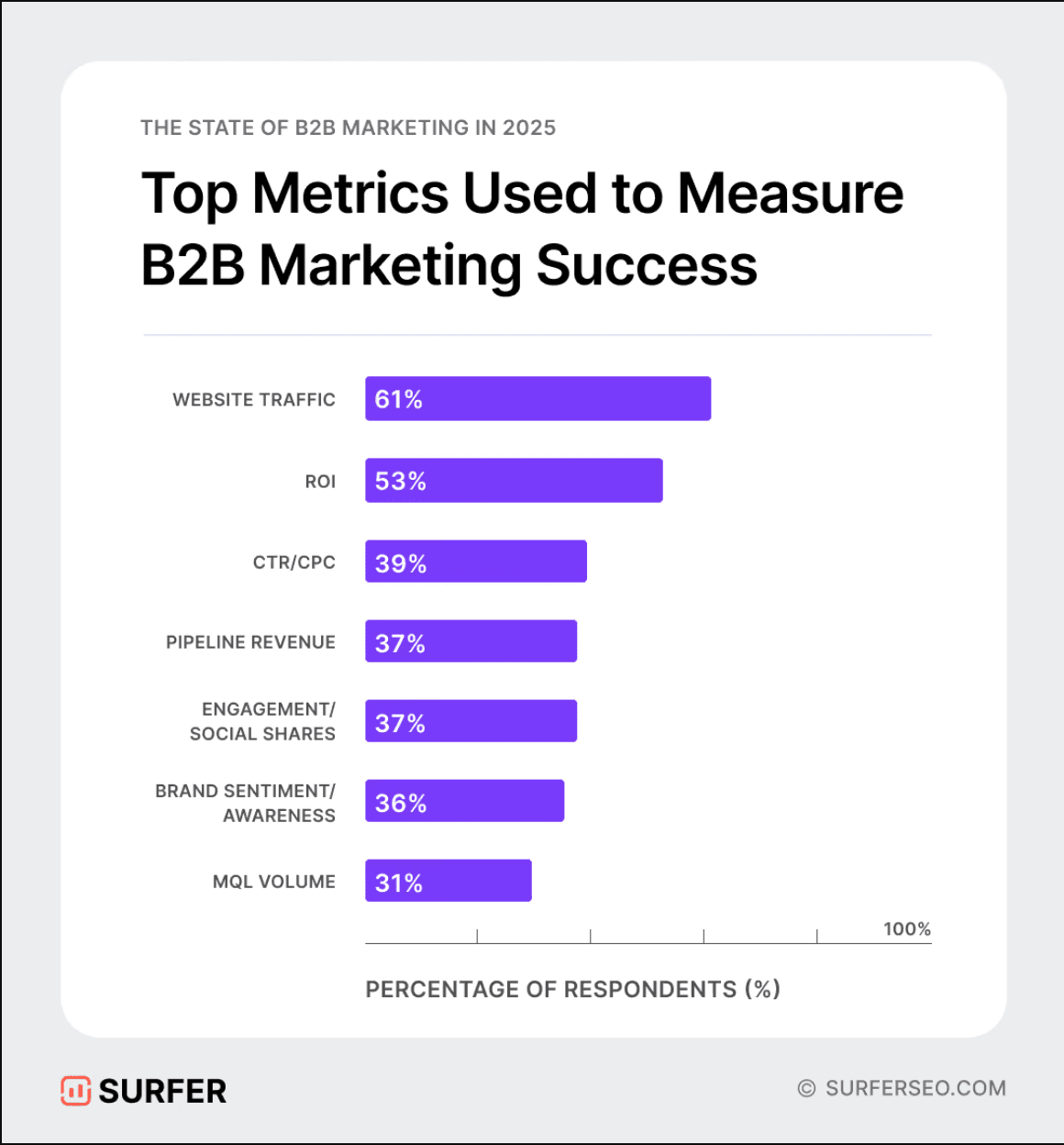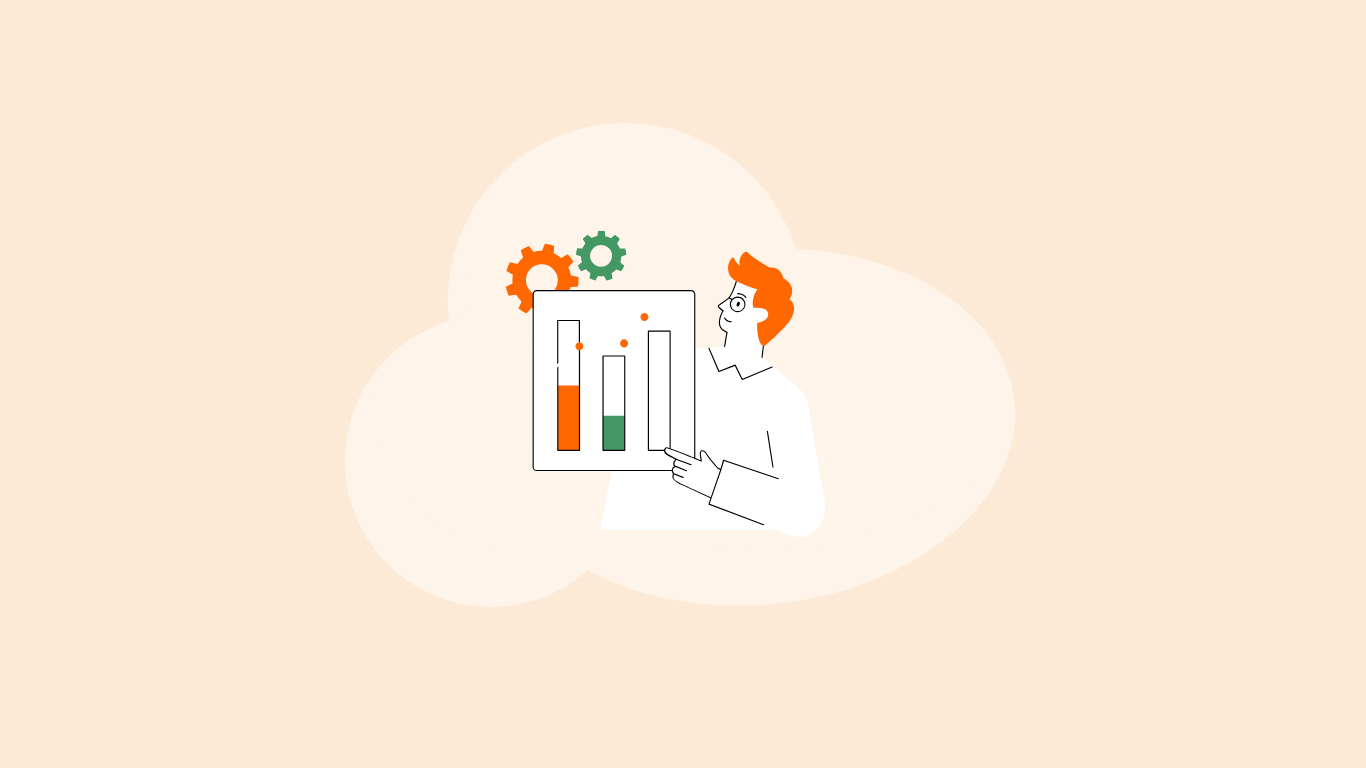Summarize this blog post with:
Are your B2B marketing efforts truly driving results?
B2B organizations invest an average of 8.7% of their total budget into marketing, but how do you know if that investment is paying off? Are your efforts reaching the right audience, generating the expected leads, and delivering measurable results?
Don’t worry. That’s what our blog aims to answer.
In this blog, we’ll explore how to track and evaluate the success of your B2B marketing efforts. Here you’ll find:
- Understanding B2B marketing metrics
- Importance of tracking B2B marketing KPIs and metrics
- 23 Key metrics to track in B2B marketing campaigns
- Choosing the relevant B2B marketing metrics to track
- Best software for B2B marketing measurement
- Five proven tactics for smarter B2B Measurement
- How to use Two Minute Reports to measure your B2B marketing efforts?
- Scaling B2B Marketing ROI
Understanding B2B marketing metrics
To truly measure your B2B marketing effectiveness, you need to assess beyond surface-level data. It’s about understanding the metrics that directly tie into your business goals and paint a full picture of your marketing performance.
B2B marketing metrics span multiple areas – from brand awareness and lead generation to customer acquisition and retention. The goal is to evaluate your strategies, make data-driven adjustments and drive better, more actionable results over time.
The key elements of B2B marketing metrics include:
- Comprehensive tracking: Measuring a range of metrics across awareness, engagement, and conversions.
- Alignment with goals: Focus on metrics that directly support your business objectives.
- Continuous refinement: Use real-time insights to continuously refine and enhance your overall strategy.
By focusing on the right metrics, you can make smarter decisions, allocate effective resources, and ensure your efforts lead to long-term growth.
Why are B2B marketing KPIs and metrics important to track?
Tracking B2B marketing KPIs and metrics is essential for assessing campaign performance. They reveal what’s working and what isn’t, allowing you to make relevant adjustments. Besides, these metrics help you identify areas of overspending, providing you with opportunities to minimize wastage and optimize ROI.
Here are a few key points that demonstrate the benefits of B2B marketing metrics:
- Properly utilizing metrics helps identify profitable lead sources, optimizing your marketing spend for better returns.
- Tracking KPIs highlights opportunities for adjustments, ensuring continuous improvement in your campaigns.
- Measuring performance offers insights into market perception, allowing you to fine-tune your messaging.
- Regular analysis and measurement ensure you’re agile and ahead of the competition by adapting quickly to changes.
- KPI tracking encourages experimentation, driving growth and improving team performance.
- Quantifiable metrics simplify the conversion process, providing clear results to optimize efforts.

Ready to optimize your lead generation efforts? Use our free, customizable Facebook Ads lead generation template to track key metrics, top-performing ads, lead trends, demographic and regional breakdown. Maximize ROI without juggling spreadsheets.
23 Essential B2B Marketing KPIs to Measure
Remember that B2B marketing is not defined by a single, standard set of KPIs. While website traffic and ROI indicate the strength of your conversion funnel, brand awareness, MQL, CLV, CAC, etc, are built around different aspects of your customer journey. Your B2B marketing efforts should be centered around optimizing different touchpoints along the journey.

To make it easy, I have listed the 23 important B2B marketing KPIs to help improve your marketing performance.
How to choose relevant B2B SaaS marketing KPIs to track?
To effectively measure the success of your marketing efforts in SaaS, it is essential to identify and track the key B2B SaaS marketing KPIs and metrics that align with your business objectives. Consistently monitoring these metrics will provide valuable insights, allowing you to make informed, strategic decisions that drive performance.
The following are the important steps involved in choosing the relevant B2B SaaS marketing metrics:
- Have a clear understanding of your business objectives and align marketing KPIs accordingly.
- Break down the customer journey into different stages (awareness, consideration, decision) and map relevant KPIs for each stage.
- Evaluate the performance of all marketing channels, focusing on those that generate high-quality leads and conversions.
- Analyze customer behavior to understand how they engage with your product or service.
- Track customer retention and advocacy metrics to nurture existing customers.
- Align your KPIs with financial goals, such as CLV, CAC, and ROI.
- Constantly review and adjust your KPIs to ensure they remain relevant and aligned with your marketing goals.
Best software for B2B marketing measurement
Choosing the best software for B2B marketing measurement is challenging due to the availability of numerous options in the market. To make the right move, it is important for the software you choose to possess the following capabilities:
- Comprehensive analytics dashboard
- Real-time data tracking
- Customizable reporting templates
- Multi-channel attribution analysis
- Integration with CRM systems
- Advanced segmentation capabilities
- ROI calculation and analysis
- Lead generation and tracking
- Performance benchmarking tools
- Conversion funnel visualization
By selecting software with the above-mentioned features, you can ensure a more streamlined approach to tracking and analyzing your B2B marketing performance. This is where an automated marketing reporting software, such as Two Minute Reports, helps collect KPIs from 30+ sources and lets you present clear, actionable reports.
Five proven tactics for smarter B2B measurement
Let us explore the five crucial strategies that help you align the process of B2B marketing measurement with the right approach.
1. Focus on the right metrics for each funnel stage
Each stage of the B2B marketing sales funnel requires tracking specific key performance indicators (KPIs) to measure marketing success effectively. During the awareness phase, prioritize metrics such as website traffic, social media reach, and search engine visibility. As prospects progress through the funnel, measure key engagement metrics, such as email marketing open rates, click-through rates, and social media engagement. Finally, in the decision-making phase, focus on conversion rates, sales qualified opportunities, and metrics tied to revenue growth such as monthly recurring revenue and customer acquisition cost.
This targeted approach ensures clarity on what to measure at each stage, improves your ability to identify bottlenecks, and helps marketing teams refine strategies to guide potential customers through the buyer's journey more efficiently.
2. Implement multi-channel attribution
In business-to-business marketing, multiple channels and touch points influence a prospect’s decision to convert. For example, LinkedIn ads and Google Ads might generate initial awareness and attract new leads, while email marketing campaigns nurture these leads toward becoming potential customers.
By using multi-channel attribution models, you gain a comprehensive understanding of how each marketing initiative - whether paid campaigns, organic search, social media advertising, or email marketing contributes to lead generation and final conversion. This insight enables better allocation of advertising spend and helps optimize marketing investment for maximum return.
3. Leverage real-time data to pivot quickly
Tracking performance in real-time through automated marketing dashboards helps marketing teams spot underperforming campaigns early. Instead of waiting for end-of-month reports, you can visualize what’s working and what isn’t instantly. For instance, if your paid media campaigns show a sudden spike in cost per click or cost per lead, you can take immediate action by pausing underperforming ads or reallocating your ad spend to higher-performing channels, thereby preventing wasted advertising spend and improving overall marketing ROI.
4. Segment and measure performance by buyer persona
To drive meaningful engagement and conversions, it’s essential to segment your audience based on firmographics such as industry, company size, and revenue, as well as buyer behavior like purchase intent or product interest. By understanding the unique pain points and business decisions of each buyer persona, you can tailor your digital content and marketing messages to resonate effectively. This segmentation ensures your marketing efforts generate leads that are more likely to convert into new business customers, optimizing the sales funnel and strengthening business relationships.
5. Benchmark against competitors to stay ahead
Don’t rely solely on internal metrics - evaluate and compare your B2B marketing KPIs against industry benchmarks and competitors. Benchmarking customer acquisition cost, return on marketing investment, conversion rates, and monthly recurring revenue against competitors helps identify performance gaps and areas for improvement. This competitive analysis not only reveals where you can optimize but also gives your marketing teams a strategic edge, ensuring your campaigns perform at their highest potential compared to competitors in your target market.
By applying these five actionable tactics, you can ensure a more efficient, data-driven approach to B2B marketing measurement, leading to improved decision-making and higher overall performance.
How to use Two Minute Reports to measure your B2B marketing efforts?
Whether you're running an account-based marketing (ABM) campaign on LinkedIn or a lead generation campaign on Facebook, tracking the right KPIs is crucial to measuring and enhancing your performance. If you run an agency, consistency and data-driven insights are essential to deliver client-ready reports that drive revenue and reinforce your strategy.
To achieve this, you need to streamline your B2B marketing KPIs into a single, automated dashboard. Two Minute Reports simplifies this process by extracting and consolidating key KPIs from multiple marketing platforms, saving you valuable time so you can focus on strategy, not spreadsheets.
Here’s how Two Minute Reports works:
- Connect your data sources: Two Minute Reports integrates with 30+ marketing and advertising platforms. You can export data to Google Sheets and Looker Studio within minutes, no manual copying needed.
- Select a template: Choose from 100+ templates to track and analyze your B2B marketing performance.
- Customize your dashboard: Build client-focused dashboards tailored to track key B2B marketing KPIs and that reflect how your marketing efforts help translate your client’s investment into revenue.
- Share instantly: Share actionable, white-labeled marketing reports as PDF or emails.
- Stay on track: Set up custom refresh schedules, so your clients receive real-time insights without having to manually wait.
Scale B2B Marketing ROI with the right approach
Even the strongest B2B marketing strategy can fall short without a robust measurement framework. In the era of a complex buying environment, understanding which key performance indicators truly drive your marketing initiatives is essential.
The metrics you choose should guide every stage of your marketing efforts – from planning and execution to ongoing performance monitoring. These KPIs should not be afterthoughts or post-campaign metrics but integral to your marketing strategy. The right B2B marketing metrics provide a clear picture of how your campaigns perform, highlight areas for improvement, and uncover opportunities to optimize resources for maximum revenue growth.
Frequently Asked Questions
Aligning KPIs with your business goals ensures that your marketing efforts are directly contributing to measurable outcomes. It allows you to track what's working and make adjustments in real-time, ensuring you're investing in the right strategies to drive growth.
Real-time tracking helps you catch underperforming campaigns early. With Two Minute Reports, you can create live dashboards that pull data from multiple platforms, providing instant visibility into key metrics. This allows you to make immediate adjustments and optimize your campaigns.
To ensure your KPIs are effective, select metrics that are tied directly to business outcomes, such as lead conversion rates, customer acquisition cost (CAC), and ROI. Avoid vanity metrics and focus on those that reflect the buyer's journey and the overall impact of your marketing efforts.
Yes, Two Minute Reports can automate the generation of detailed, client-ready reports across multiple platforms. It simplifies KPI tracking by integrating data from sources like Google Analytics, Facebook Ads, and more, providing you with actionable insights that drive smarter decision-making.
By regularly monitoring your KPIs and leveraging real-time insights, you can identify underperforming areas and optimize them on the fly. With Two Minute Reports, you can make this process easier, enabling you to make data-backed decisions that continuously improve your strategy and increase ROI.
You can install the Two Minute Reports add-on from the Google Workspace Marketplace. Once done, you can integrate 30+ data sources, build custom marketing dashboards, and automate client-ready reports to streamline your workflow and make data-driven decisions.
Related Blogs

Meet the Author
Shalini MuruganShalini is driven by ideas that create a tangible impact. At Two Minute Reports, she specializes in content that helps marketers optimize their reporting workflows. When she's not transforming complex data into meaningful insights, you might find her lost in a book, jotting down ideas in her notebook, or connecting the dots others overlook.





